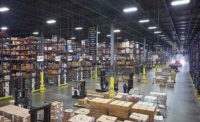Your customer needs a handful of 1/8-in. galvanized nipples, but none of your vendors or suppliers have them in stock. Next time, they require 12,000 2-in. 150# street ells delivered to a job site within 48 hours. Problem is, the manufacturer won't have a production run for three to six weeks.
The scenario above sounds, unfortunately, all too familiar. PVF distributors face such challenges every day. All over the country, inventories are being scaled back while manufacturers are streamlining product lines, making it more and more difficult to anticipate - and fulfill - customer demands.
Which is why many wholesalers are turning to master distributors.
Why a master distributor? By serving a dual role, as both wholesale distributor and manufacturer, a master distributor can offer a broad range of products along with a comprehensive inventory. Often, when a manufacturer doesn't have its own material on the shelf, a master distributor will have the product in stock. In essence, the master distributor becomes a warehouse for the manufacturer, able to accommodate both the large and small orders that most manufacturers can't, or won't, deal with on a daily basis.
Our company, Smith-Cooper International, based in Montebello, California, with distribution centers in Washington and Texas, has been a master distributor of valves, fittings, and nipples for 50 years. Smith-Cooper's average order runs 25 line items valued at $200 -requiring same-day pick-up or delivery.
Many manufacturers just aren't set up for that kind of service. The master distributor, then, becomes a vital link in the channel of distribution between customer and manufacturer.
"It's a partnership," says Ron Kurstin, president of Smith-Cooper International. "We really do service the manufacturer as much as the customer."
As with any good relationship, Kurstin says, the benefits are enormous: "Customers get the items they need at a competitive price, while manufacturers get commitments to sell large quantities of their product."
In addition, as a master distributor, Smith-Cooper International protects wholesalers and distributors by not selling directly to OEMs, end-users or contractors.
The key is finding a master distributor who has control of a product's availability. Many so-called master distributors actually work through a broker themselves.
Our company doesn't deal with brokers. We are the broker. Our customers are dealing direct as they can without committing to container upon container of product. That's our role. And we brand it; that is, we put our SCI logo on each item, so that we are, in essence, staking our reputation that, yes, we will sell X number of containers of this product and that it will be exactly what you want.
With today's focus on vendor consolidation, master distributors are becoming a popular option. For example, say a supply house needs to restock an assortment of malleable nipples and forged steel fittings. Why bother calling three different suppliers? Make one call to a master distributor, fill the entire order, and have everything shipped out that same day - with a near perfect fill rate.
Using a master distributor can further reduce costs by drop-shipping directly to the customer or wholesaler to eliminate extra handling and operational costs.
A master distributor can help, too, with those "oddball" orders, such as the customer who needs a few 8-in. malleable threaded 90 ells or some 2-in. by 1-in. by 1/2-in. tees.
Even more important than quantity is quality. Like a manufacturer, true master distributors take responsibility for all aspects of quality control for the products they supply. In so doing, they can establish a level of trust with their customers, ensuring that every item meets strict criteria. Such product liability is what differentiates the master distributor from the broker or importer. Smith-Cooper actually casts its trademark on each fitting, and backs that with product liability insurance. That way, if there are any questions, a customer knows who to call.
Today, more than ever, it's a world market. That's why master distributors must utilize both domestic and international manufacturers. Over the last decade, domestic supply sources have dwindled; for example, there are only two manufacturers of malleable fittings left in the U.S. To fulfill demand, overseas sources have become a necessity. While Smith-Cooper produces all of its steel and brass nipples domestically, the majority of its pipe fittings are produced in specialty countries abroad.
"Maybe several distributors can find import products available at a decent price," Kurstin notes, "but when a problem arises, how are they going to reach a factory in, say, Asia or South America?"
That, Kurstin says, is where a reputable master distributor can provide the greatest service to its customers. The master distributor, then, is not so much a customer of a supplier, but rather a partner with it.
The master distributor of tomorrow will need to deal with the following trends:
- The Internet - In the future, the Web will be one of the originating order points. A master distributor's entire database will be live on the Internet, so customers will be able to visit the Web site, check the stock and place orders instantly.
- Consolidation - Wholesalers are getting bigger, and their main focus is reducing inventory. Turns are maximized as inventory goes in and out. That leads to more vendor/supplier consolidation and a greater need for reliable master distributors with a broad product line base.
- Standardization & integration - A massive inventory is one thing, but using uniform pre-set package sizes and finding creative ways to maximize it to fit best into the warehouse is another.
- Globalization - Nowadays it's not import vs. domestic, or knowing if it came from China, Thailand, Japan or South America. It's a world market today. By allying with the world's best factories you bring customers the best of their inventories; you can take advantage of it all.
It's a matter of streamlining and simplifying. It all comes back to profitability stemming from lowered operational costs, tangible cost savings on overhead.
PVF Forum is your sounding board
The industrial pipe, valves and fittings business is a ruthlessly competitive arena that seems to be in a constant state of flux. "PVF Forum" will be a regular Supply House Times column open to any contributors who have something to offer in the way of news, commentary or ideas pertaining to any of the following areas:- PVF technology
- PVF economics
- PVF manufacturing
- PVF distribution
- Business issues concerning any of the above
- Government affairs impinging on the PVF industry
- Trade association activities related to PVF
- Other suggestions are welcome.
Contact editor Jim Olsztynski at 847/297-3714, or wrdwzrd@aol.com to find out more about becoming a guest commentator in PVF Forum.


